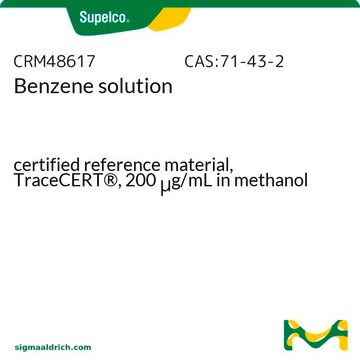About This Item
74.6 mmHg ( 20 °C)
Recommended Products
Agency
ISO
USP/NF
reag. Ph. Eur.
Quality Level
vapor density
2.77 (vs air)
vapor pressure
166 mmHg ( 37.7 °C)
74.6 mmHg ( 20 °C)
grade
puriss. p.a.
Assay
≥99.7%
form
liquid
autoignition temp.
1043 °F
expl. lim.
8 %
impurities
≤0.0002% free alkali (as NH3)
≤0.0004% free acid (as HCl)
≤0.001% non-volatile matter
≤0.03% water (Karl Fischer)
≤1 ppm thiophene
color
APHA: ≤10
refractive index
n20/D 1.5000-1.5020
n20/D 1.501 (lit.)
bp
80 °C (lit.)
mp
5.5 °C (lit.)
transition temp
solidification point ≥5.2 °C
density
0.874 g/mL at 25 °C (lit.)
cation traces
Al: ≤0.5 mg/kg
B: ≤0.02 mg/kg
Ba: ≤0.1 mg/kg
Ca: ≤0.5 mg/kg
Cd: ≤0.05 mg/kg
Co: ≤0.02 mg/kg
Cr: ≤0.02 mg/kg
Cu: ≤0.01 mg/kg
Fe: ≤0.1 mg/kg
Mg: ≤0.1 mg/kg
Mn: ≤0.02 mg/kg
Ni: ≤0.02 mg/kg
Pb: ≤0.01 mg/kg
Sn: ≤0.1 mg/kg
Zn: ≤0.01 mg/kg
SMILES string
c1ccccc1
InChI
1S/C6H6/c1-2-4-6-5-3-1/h1-6H
InChI key
UHOVQNZJYSORNB-UHFFFAOYSA-N
Looking for similar products? Visit Product Comparison Guide
Related Categories
General description
Application
Other Notes
Signal Word
Danger
Hazard Statements
Precautionary Statements
Hazard Classifications
Aquatic Chronic 3 - Asp. Tox. 1 - Carc. 1A - Eye Irrit. 2 - Flam. Liq. 2 - Muta. 1B - Skin Irrit. 2 - STOT RE 1
Target Organs
Blood
Storage Class Code
3 - Flammable liquids
WGK
WGK 3
Flash Point(F)
12.2 °F
Flash Point(C)
-11 °C
Choose from one of the most recent versions:
Already Own This Product?
Find documentation for the products that you have recently purchased in the Document Library.
Customers Also Viewed
Our team of scientists has experience in all areas of research including Life Science, Material Science, Chemical Synthesis, Chromatography, Analytical and many others.
Contact Technical Service







